Criticism
1999: A Space Oddity
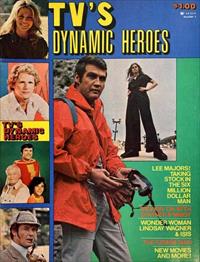
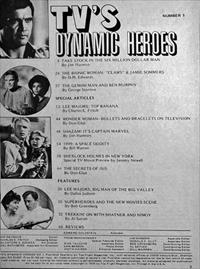
TV's Dynamic Heroes, 1976, p54-57. Bill Warren was a film historian and critic specialising in science fiction, and wrote Keep Watching the Skies! American Science Fiction Movies of the Fifties (1982). He was a frequent contributor to Famous Monsters of Filmland magazine, and an assistant to publisher Forrest J Ackerman.
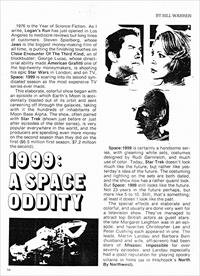
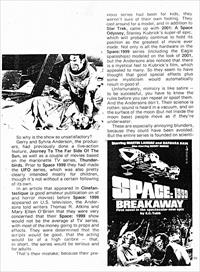
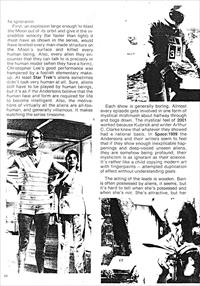
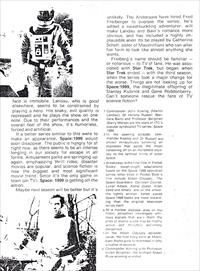
1976 is the Year of Science Fiction. As I write, Logan's Run has just opened in Los Angeles to mediocre reviews but long lines of customers. Steven Spielberg, whose Jaws is the biggest money-making film of all time, is putting the finishing touches on Close Encounters Of The Third Kind, an sf blockbuster; George Lucas, whose directorial ability made American Graffiti one of the top-twenty moneymakers, is shooting his epic Star Wars in London; and on TV, Space: 1999 is soaring into its second syndicated season as the most expensive TV series ever made.
This elaborate, colourful show began with an episode in which Earth's Moon is accidentally blasted out of its orbit and sent careening off through the galaxies, taking with it the hundreds of inhabitants of Moon Base Alpha. The show, often paired with Star Trek (shown just before or just after episodes of the older series), is very popular everywhere in the world, and the producers are spending even more money on the second season than they did on the first ($6.5 million first season, $7.2 million the second).
Space: 1999 is certainly a handsome series, with gleaming white sets, costumes designed by Rudi Gernreich, and much use of colour. Today, Star Trek doesn't look much like the future, but rather like yesterday's idea of the future. The costuming and lighting on the sets are both dated, and the show now has a rather quaint look. But Space: 1999 still looks like the future. Not 23 years in the future perhaps, but more like 5 to 10. Still, that's something; at least it doesn't look like the past.
The special effects are elaborate and colourful, and usually are done very well for a television show. They've managed to attract top British actors as guest stars: the late Margaret Leighton was in an episode. and favourites Christopher Lee and Peter Cushing each appeared in one. The leads, Martin Landau and Barbara Bain (husband and wife, off-screen) had been stars of Mission: Impossible for over seventy episodes, and Landau especially had a good reputation for playing spooky villains in films (as in Hitchcock's North By Northwest).
So why is the show so unsatisfactory?
Gerry and Sylvia Anderson, the producers, had previously done a live-action feature, Journey To The Far Side Of The Sun, as well as a couple of movies based on the marionette TV series, Thunderbirds. Prior to Space 1999 they had made the UFO series, which was also pretty clearly intended mostly for children, though it's not without a certain following of its own.
In an article that appeared in Cinefantastique (a good amateur publication on sf and horror movies) before Space: 1999 appeared on U.S. television, the Andersons told writers Thomas R. Atkins and Mary Ellen O'Brien that they were very concerned that their Space: 1999 show would not be the average sf TV series, with most of the money going to props and effects. They were determined that the scripts would be good, that the acting would be of a high calibre -- that, in short, the series would be serious and for adults.
That's their mistake; because their previous series had been for kids, they weren't sure of their own footing. They cast around for a model, and in addition to Star Trek, came up with 2001: A Space Odyssey, Stanley Kubrick's super-sf epic, which will probably continue to hold its position as the greatest sf movie ever made. Not only is all the hardware in the Space: 1999 series (including the Eagle spaceships) modelled on the look of 2001, but the Andersons also noticed that there is a mystical feel to Kubrick's film, which appealed to many. So they seem to have thought that good special effects plus some mysticism would automatically result in good sf.
Unfortunately, mimicry is like satire -to be successful, you have to know the rules before you can repeat or spoof them. And the Andersons don't. Their science is rotten: sound is heard in a vacuum, and on the surface of the moon (but not inside the moon base) people move as if they're underwater.
These are especially annoying blunders, because they could have been avoided. But the entire series is founded on scientific ignorance.
First, an explosion large enough to blast the Moon out of its orbit and give it the incredible velocity (far faster than light) it must have as shown in the series, would have levelled every man-made structure on the Moon's surface and killed every human being. Also, every alien they encounter that they can talk to is precisely in the human model (when they have a form). Christopher Lee's good performance was hampered by a foolish elementary makeup. At least Star Trek's aliens sometimes didn't look very human at all. Sure, aliens still have to be played by human beings, but it's as if the Andersons believe that the human face and form are required for life to become intelligent. Also, the motivations of virtually all the aliens are all-too human, and generally villainous. It makes watching the series tiresome.
Each show is generally boring. Almost every episode gets involved in one form of mystical mishmash about halfway through and bogs down. The mystical feel of 2001 worked because Kubrick and writer Arthur C. Clarke knew that whatever they showed had a rational basis. In Space:1999 the Andersons and their writers seem to feel that if they show enough inexplicable happenings and deep-voiced unseen aliens, they are somehow being profound; their mysticism is as ignorant as their science. It's rather like a child copying modern art with fingerpaints -- attempted duplication of effect without understanding goals.
The acting of the leads is wooden. Bain is often possessed by aliens, it seems, but it's hard to tell when she's possessed and when she's not. She's attractive, but her face is immobile. Landau, who is good elsewhere. seems to be constrained by playing a hero. His snaky, evil quality is repressed and he plays the show on one note. Due to their performances and the overall feel of the show, it's humourless, forced and artificial.
If a better series similar to this were to make an appearance, Space:1999 would soon disappear. The public is hungry for sf right now, as there seems to be an intense longing in our society for escape in all forms. Amusement parks are springing up again. emphasizing thrill rides; disaster movies are popular, and science fiction is now the biggest and most significant movie trend. Since it's the only game in town (on TV). Space: 1999 is getting all the action.
Maybe next season will be better but it's unlikely. The Andersons have hired Fred Freiberger to oversee the series; he's added a swashbuckling adventurer, will make Landau and Bain's romance more obvious, and has included a highly implausible alien (to be played by Catherine Schell, sister of Maximilian) who can alter her form to look like almost anything she wants. Catherine is not related to Maximilian
Freiberg's name should be familiar -- or notorious -- to TV sf fans. He was associated with Star Trek, but began when Star Trek ended -- with the third season, when the series took a major change for the worse. Things are not looking up for Space: 1999, the illegitimate offspring of Stanley Kubrick and Gene Roddenberry. Can't someone rescue the fans of TV science fiction?
Captioned Photos